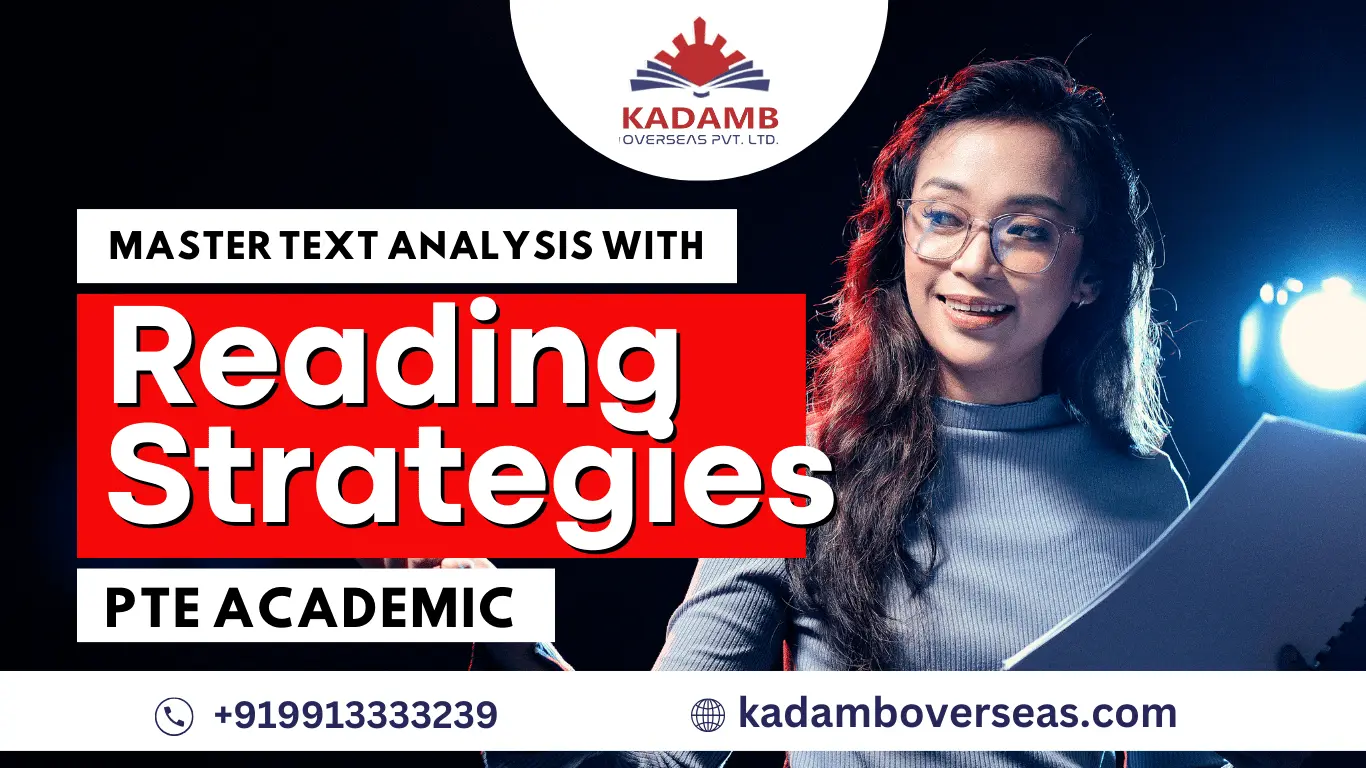Are you tired of spending hours pouring over dense passages in preparation for the PTE Academic exam? Mastering text analysis is a crucial skill that can significantly improve your reading efficiency and comprehension.
Imagine being able to breeze through complex texts with ease, quickly identifying key information and extracting important details. In this article, we will explore efficient reading strategies specifically tailored for the PTE Academic exam, empowering you to conquer the reading section with confidence and precision.
As test-takers, we often find ourselves overwhelmed by the sheer volume of material we need to cover. However, by honing our text analysis skills, we can transform our approach to reading and unlock a whole new level of proficiency. Whether you struggle with time management during the exam or simply want to enhance your ability to dissect challenging texts, mastering these strategies will revolutionize your approach to reading comprehension.
Join us as we delve into practical techniques that will not only improve your performance on the PTE Academic but also equip you with invaluable skills for academic and professional endeavors beyond the exam room.
Understanding PTE Academic Reading Section
The PTE Academic reading section requires more than just reading comprehension; it demands a strategic approach to tackle a diverse range of question types. To excel in this section, test takers must understand how to analyze and interpret various text formats effectively. One crucial insight is to recognize the importance of skimming and scanning techniques for quickly identifying key information in passages.
Additionally, having a sharp awareness of different question types, such as multiple-choice, fill in the blanks, and re-order paragraphs, can significantly enhance test performance. By adopting a proactive mindset and honing these skills, candidates are better equipped to navigate the complex reading section with confidence. PTE Listening Mastery: Overcoming Challenges for Maximum Scores
Furthermore, understanding the underlying purpose and tone of a given passage is instrumental in answering inference-driven questions. PTE Academic’s reading section often includes subtle clues within texts that require readers to grasp the author’s intent or attitude. It’s vital for test takers to practice identifying implicit meanings in order to proficiently respond to questions that assess their ability to infer information from the text.
Moreover, recognizing cohesive devices such as transitional words or synonyms can aid in comprehending connections between ideas within passages—an essential skill for achieving high scores on this portion of the exam.
Importance of Efficient Text Analysis
Efficient text analysis is a fundamental skill that transcends academic disciplines and professional fields. Whether you are a student preparing for the PTE Academic or a working professional, the ability to quickly and accurately analyze written content is invaluable. It allows you to extract key information, comprehend complex ideas, and make informed decisions.
In the context of the PTE Academic, mastering text analysis enables test takers to efficiently answer reading comprehension questions, summarize passages, and effectively convey their understanding of the text within the allotted time.
Moreover, efficient text analysis empowers individuals to critically evaluate information presented in various formats such as articles, essays, reports, and research papers. By honing this skill set, one can decipher underlying meanings, identify main arguments or points of contention expressed by authors or speakers and articulate a well-reasoned response when required.
Employers also seek individuals who possess strong analytical skills as they are essential for processing large volumes of data in a methodical manner thus contributing towards informed decision making within organizations. Therefore it is imperative to recognize not only its relevance in academia but also its widespread importance across numerous professional endeavors. PTE Writing Tasks: Essay and Summary Structure
Skimming and Scanning Techniques
Skimming and scanning are two indispensable techniques for efficient reading and text analysis. Skimming involves quickly glancing over the text to grasp the main ideas, while scanning is about searching for specific information or keywords. These techniques not only save time but also help in comprehending and retaining essential information.
When skimming, it’s crucial to focus on headings, subheadings, topic sentences, and concluding paragraphs as they often encapsulate the key points of a passage. Similarly, when scanning, one should utilize techniques such as using keywords or relevant terms to locate specific details within the text swiftly.
Mastering these techniques enables test-takers to navigate through lengthy passages effectively during PTE Academic exams. By adopting these strategies, candidates can efficiently manage their time and answer questions accurately.
Incorporating skimming and scanning into one’s reading strategy provides a comprehensive understanding of complex texts within a limited timeframe. Moreover, practicing these techniques regularly improves reading speed without compromising comprehension—a vital skill for success in tests like PTE Academic where time management is crucial.
Embracing these methods not only enhances exam performance but also equips individuals with valuable lifelong skills that can be applied across various academic and professional endeavors.
Note-taking and Summarization Skills
Effective note-taking and summarization skills are essential for mastering text analysis, especially in the context of PTE Academic. When taking notes, it’s important to focus on key points, main ideas, and supporting details while actively engaging with the text.
Utilizing techniques such as mind mapping or bullet-point summaries can help crystallize important information and aid in the retention of complex concepts. By practicing concise summarization, test-takers can strengthen their ability to extract the most salient details from a passage, which is crucial for succeeding in the reading section of PTE Academic.
Moreover, honing note-taking and summarization skills not only enhances comprehension but also fosters efficient time management during the exam. Strategically captured notes and succinct summaries enable candidates to quickly locate pertinent information when answering questions or writing responses.
Additionally, synthesizing information into cohesive summaries cultivates critical thinking abilities by encouraging students to evaluate and prioritize content based on relevance and significance. Thus, elevating note-taking and summarization skills can directly impact overall performance in PTE Academic by empowering individuals to approach textual analysis with precision and confidence.
Identifying Key Information in Texts
In today’s fast-paced world, the ability to identify key information in texts is an essential skill for academic and professional success. When reading a text, it’s crucial to focus on the main ideas, supporting evidence, and any recurring themes or arguments.
One effective strategy for identifying key information is to actively engage with the text by asking questions such as What is the author’s main argument? or How does this point contribute to the overall message? By approaching texts with a critical mindset, readers can efficiently pinpoint important details that are relevant to their goals. PTE Speaking Test: Strategies for Pronunciation and Oral Fluency
Moreover, understanding the context and purpose of a text can significantly aid in identifying key information. By considering factors such as the author’s background, intended audience, and publication date, readers can discern the underlying motives behind the text and extract pertinent details with greater clarity.
Additionally, employing techniques like skimming and scanning can help readers swiftly locate essential information within a text while omitting extraneous details. Overall, honing these skills in identifying key information will not only enhance one’s reading comprehension but also improve performance in assessments like PTE Academic.
Practice Exercises to Improve Reading Efficiency
When it comes to improving reading efficiency for the PTE Academic, practice exercises are essential. One effective exercise involves setting a timer and reading a passage within a specific time limit, aiming to increase speed without sacrificing comprehension. Another useful exercise is skimming through a text to identify key points and then going back for detailed reading, which trains the mind to quickly grasp the main ideas.
Additionally, practicing with a variety of texts on different topics can improve adaptability and enhance overall reading proficiency. By consistently engaging in such exercises, test-takers can develop the skill of efficient text analysis, leading to improved performance in the PTE Academic.
Furthermore, incorporating visualization techniques into practice exercises can be highly beneficial. For instance, while reading passages, individuals can visualize key concepts or events in their minds as they go along.
This not only aids in retention but also helps in processing information more swiftly. Another valuable technique is to engage in frequent summarization of texts after each paragraph or page read, which reinforces understanding and encourages active engagement with the material rather than passively consuming it.
Through these innovative practice strategies that focus on speed, comprehension, adaptability, and active processing of information, test-takers can substantially elevate their reading efficiency for success in the PTE Academic examination.
Conclusion: Mastering Text Analysis for PTE Success
In conclusion, mastering text analysis is not just a skill but an art that can significantly impact your success in the PTE Academic exam. By honing your ability to understand and interpret complex texts, you open the door to higher scores in both the reading and listening sections. Moreover, with a solid grasp of text analysis, you’ll be better equipped to tackle tasks requiring summarization and rephrasing, giving you an edge in the speaking and writing components as well.
Furthermore, developing proficiency in text analysis involves not only comprehending the literal meaning of a passage but also recognizing underlying themes, tone, and authorial intent. This multifaceted approach allows test-takers to engage with texts on a deeper level, leading to more nuanced responses during the exam.
Ultimately, by mastering text analysis for PTE success, candidates can harness the power of language to convey their own ideas effectively while demonstrating a thorough understanding of complex written material—a crucial skill set for academic and professional pursuits alike.
Connect with our country experts at Kadamab overseas education consultants to kickstart your journey toward studying abroad contact us now





